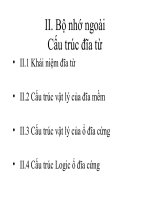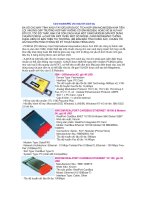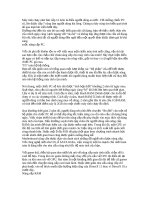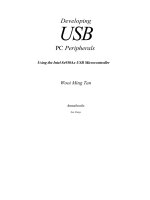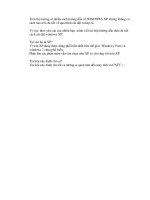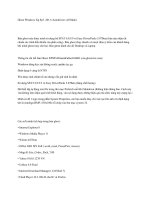WRITING 6VB1 Bài giảng Business Writing 1 Thư Viện Tài Liệu Tổng Hợp Com WRITING 6VB1
Bạn đang xem bản rút gọn của tài liệu. Xem và tải ngay bản đầy đủ của tài liệu tại đây (245.42 KB, 19 trang )
COURSE TITLE : WRITING 6
Lecturer: Le Thi Bich Vy, MA
Course books:
-
Alice, A. & Patricia, M.(2005). Effective Academic Writing 2: The Short Essay.
Oxford University Press. (Unit 1 & 2)
Jason, D. & Rhonda, L.(2006). Effective Academic Writing 3: The Essay. Oxford
University Press.( Unit 3,4 & 5)
UNIT 1: DESCRIPTIVE ESSAYS
Focus : essay organization, adjectives and comparison in descriptive writing
THEORY:
-
A descriptive organization(p.33)
-
Adjectives in descriptive writing(p.p. 38-43)
-
Similes(p.p40-41)
PRACTICE
1. Analyze the descriptive structure
-
Exercise 2, 3, 4, 5(p.p. 28-35)
MORE PRACTICE
Exercise 1: Work out the outline for the essays below
Essay 1:
Trees
Trees are wonderful plants. Most of us like to sit under a large tree on a hot summer day.
Children love to climb trees and artists like to draw them. When we look at a tree, we may think
only of its beauty, but a tree actually has a complex physical structure. The structure of a tree
consists of three main parts: the leaves, the branches and trunk, and the roots.
Under the ground, the roots spread out to anchor the tree. As they spread out away from the
tree, the main roots become small roots. The root system absorbs water from the soil and sends it up
to the trunk and branches.
Page 1 of 19
Above the ground, the roots form the trunk. The job of the trunk is to support the branches.
Near the top of the tree, the trunk divides into branches. Together, the trunk and branches give the
tree its shape.
At the top of the tree, the leaves grow out of the branches. The main job of leaves is to make
food for the tree. To do this, the leaves need to receive both sunlight from above and water from
below.
In short, a tree has such a complicated structure with three main parts. Each of its parts
performs certain functions but cooperates well with each other to maintain and develop the life the
tree.
Essay 2:
My Uncle
My family is full of happy, crazy, and talented people. My aunt Margarita has a yard full of
orphaned pets. My brother Jose is an expert tailor, and my mother loves to experiment in the
kitchen. However, I think the most interesting is my mysterious uncle Patricio.
Patricio is an elderly man now, with white hair sticking up all over his head. Beneath his
messy hair, he has a wrinkled brown face and powerful dark eyes that show many emotions.
Patricio is tall and skinny. He wears baggy pants and a plaid shirt. He has a tattoo of a heart on his
arm. The heart has the word Rosa written across it in red and black letters, but he has never told me
who she is.
Patricio has an intriguing history. He and my mother were born in a small village in the
mountains. When he was seventeen, he left home to explore the world. On one trip, he went to
Siberia to look for gold. On another trip, he went to Alaska to work on a fishing boat. Now he fixes
air conditioners in Los Angeles, and during the winter months, he sometimes comes to visit us and
play the accordion.
I love spending time with my uncle Patricio. He has an interesting look and a sad and
mysterious past. He is also a talents musician. Someday, I hope that he will tell me about Rosa and
how he got the tattoo with her name.
Exercise 2: Make the outline for an essay describing your favourite fruit
2. Identify the language features of a descriptive essay
a) Prepositional phrases as adjectives
Page 2 of 19
-
Exercise 3 (p.39)
-
Exercise 1(p.48)
b) Formation of adjectives
-
Exercise 2(p.44)
c) Adjective order
-
Exercise 3 (p.45)
-
Exercise 3,4(p.49)
d) Similes
-
Exercise 5,6,7(p.41)
MORE PRACTICE
Read the essay below and:
a. Underline all the words or phrases used as adjectives in the essay
b. State how they are formed
Food from the Sea
My father told me that we should always respect nature and learn where our food comes from.
He said that food tasted better when you got it yourself and ate it in a natural place. To show me this
was true, he took me to the ocean, where we caught our own delicious crabs and ate them.
I will always remember the taste of the crabs we caught that day. The beach was quiet and still
at six o‟clock. The tide had just come in, so there were many crabs walking slowly on the white
sand. We sat a few feet away from my father‟s special crab traps. The traps were made of bamboo,
and they look like round cages, but one side had a small entrance for the crab to go in. There were
some small, fragrant fish in the trap. The fishy smell made the crap hungry, so they crawled into the
traps. We watched the craps walk into the traps, and I smelled the strong smell of the dark, oily fish.
Overhead, we heard the sounds of seagulls and pelicans in the sky. I think the seagulls wanted to eat
the fish, too. Once the traps were full, we took off our shoes and threw them over our shoulders so
we could walk on the wet sand and feel the water pushing and pulling at the beach. Later, we built a
fire and ate boiled crabs on the beach. We cracked their shells. The meat was white and pinkish and
Page 3 of 19
tender. It tasted sweet and a little salty. We did not want to stop eating them. We sat on the sand
surrounded by crab shells and watched the sun go down into the ocean.
From that day on, I knew my father was right. Food tastes best when it is something that you
have caught or grown yourself. I have eaten crabs many times since then, but it has never tasted as
good as it did that day.
3. Writing a complete essay
Choose one of the following topics and write a descriptive essay about it
a) The third campus of Lac Hong University
b) Your house or a room in the house that you like best
c) A person you admire most
d) Your favorite food or object
Page 4 of 19
UNIT 2: NARRATIVE ESSAYS
Focus: narrative organization, adverbs of time and sequence and adverbial clauses of past
time in narrative writing
THEORY
-
Narrative organization(p.58)
-
Adverbs of time and sequence(p.64)
Reference: lists of adverbs of time/ sequence:
Time:
By, after, before, at, during, around…(+ word(s) or clauses of time)
Sequence:
First, next, second, then, at last, in the end, finally, later on, after that, afterward, shortly,
subsequently, earlier, formerly, immediately…
-
Adverbial clauses of time (p.p. 64-65, p.68 and p.p.70-71)
-
Information-eliciting questions(p.66)
PRACTICE
1. Analyze the narrative organization
-
Exercise 3, 4,5(p.p. 58-60)
-
Exercise 1, 2(p.p.62-63)
MORE PRACTICE
Make an outline for your essay on the topic: an unforgettable trip or vacation
2. Explore the language features of the narrative essay
a) Adverbs of time:
-
Exercise 3: (p.64)
b) Adverbial clauses of past time
-
Exercise 4: (p.65)
-
Exercise 1,2,and 3(p.p.69-70)
Page 5 of 19
-
Exercise 4,5(p.p. 71-72)
c) The way to add details to the essay
-
Exercise 5(p.66)
3. Write a complete essay
Write a narrative essay on any of the following topics:
a) An embarrassing/ frightening/ frustrating/ interesting… experience
b) An unforgettable day at school/ at work
c) A childhood memory
Page 6 of 19
UNIT 3: PROCESS ESSAYS
Focus: process analysis organization, sequence connectors, time clauses and the use of modal
passives
THEORY:
-
Analysis of essay organization(p.36)
-
Sequence connectors(p. 43)
List of connectors:
First, firstly, first of all, at first, the first step is…
Second, secondly, next, then, after that, before, after this, later on, at this point, while,
when, since, in addition to , until
Lastly, at last, finally, in the end, eventually
-
Time clauses(p. 45)
-
Passives and modal passives(p.p. 48- 49)
PRACTICE:
1. Analyze the process analysis organization
-
Exercise 3(p.p. 36- 37)
-
Exercise 1(p.p. 41-42)
-
Exercise 5(p.39)
2. Explore the language features of narrative writing
a) Sequence connectors
-
Exercise 3, 4(p.44)
-
Exercise 1(p.53)
MORE PRACTICE
This series of pictures illustrate the process of repotting a plant. Describe them and connect the
sentences with suitable transitions.
Page 7 of 19
b) Time clauses
-
Exercise 5(p.45)
-
Exercise 2(p.53)
c) Passives
-
Exercise 1, 2,3,4, 5(p.p.49-52)
-
Exercise 3,4,5(p.p.54-55)
3. Writing a complete essay
Write a complete process essay on one of the following topics:
a) Planning a party
b) Making a dish
c) Changing a flat tyre
d) Studying for an exam
e) Growing a plant
Page 8 of 19
UNIT 4: EXPLANATION ESSAYS
Focus: cause and effect organization, connectors showing cause and effect, conditional
sentences, task identification.
THEORY:
-
Analysis of cause and effect organization(p.65)
-
Relating effects to causes(p.71)
-
Connectors of cause(p.72) and effect( p.74)
List of connectors:
Accordingly, as a result, because, consequently, for this reason, hence, if, otherwise,
since, so, then, therefore, thus.
-
Conditionals( p.p.76-77)
Reference list of subordinating conjunctions
If, unless, as long as, so long as, provided that, on condition that, supposing that, if only
PRACTICE:
1. Analysis of the essay organization
-
Exercise 2, 3, 4(p.p.60-63)
-
Exercise 3, 4(p.p.65-66)
MORE PRACTICE
Fill in the outline below with the information from the given essay below .
I.
Introduction
Topic:
-
Hook:
-
Background information: (only key words or phrases)
-
Thesis statement:
II.
-
Body paragraphs :
Body paragraph 1:
Page 9 of 19
-
Topic sentence:
-
Supporting details: (only key words or phrases)
-
Words or phrases to connect the ideas:
Body paragraph 2:
-
Topic sentence:
-
Supporting details: (only key words or phrases)
-
Words or phrases to connect the ideas:
Body paragraph 3:
III.
-
Topic sentence:
-
Supporting details: (only key words or phrases)
-
Words or phrases to connect the ideas:
Conclusion:
-
Summary of the arguments
-
Restatement:
-
Prediction, warning, or issue in broader context:
Essay 1:
Topic: Describe a custom from your country that you would like people in other countries to adopt.
Explain your choice.
In my country, many people in the town still follow an old custom that people in the cities no
longer practice. This is the custom of taking a big break at noon. In the towns, all stores and
businesses close from noon till 2:00p.m. This not only gives people a needed rest in the middle of
the day, it also allows them time with their families and contributes to a slower pace of life.
In the towns, all workers get a good rest in the middle of the day. They go home enjoy a nice
meal, take a nap, and then they return to work for the rest of the afternoon. They have energy and
enthusiasm for the rest of the day‟s work. Their afternoons can be as productive as their mornings.
Without this rest, they might be tired all afternoon and not get much work done.
In the towns, most families eat their noon meal together. They have time to enjoy their food,
talk about their morning activities with each other, and just be together. It is good for families to
have this time together. Parents hear about their children‟s activities. Husbands and wives learn
Page 10 of 19
about each other‟s daily concerns. Without this opportunity, families might not be together until
evening. They are usually tired then just want to rest.
In the towns, there is a slower pace of life. Nobody can do any business at lunchtime. They
have to wait until the afternoon. Because of this, people don‟t expect things to be done in a hurry.
They have more patience. If something doesn‟t get done today, it doesn‟t matter. This is much
healthier way to live.
A big rest at noon contributes to a better life. In the towns, people don‟t worry about getting a
lot of work done fast. They are more interested in spending time with their families and enjoying
their lives. I think that in the long run this actually improves work. In any case, it is better way to
live. I think everyone everywhere should follow the custom of taking a big break at noon.
Essay 2:
Topic: You need to travel from your home to a place 40 kilometers away. Compare the different
kinds of transport you could use. Tell which means you would choose. Explain your choice.
When I choose a means of transport to go 40 kilometers, I have three common choices: my
bike, my parents‟ car, or public transportation. When choosing them, I think about how much it will
cost, how long it will take and why I need to travel.
My bike is a less expensive alternative. The only cost is my manual labor to pedal from my
home to a place 40 kilometers away. This means, however, is extremely time consuming. I imagine
it would take me all day. Biking is excellent exercise. Therefore, if my only goal is to burn calories
and strengthen my muscles, I should go by bike.
Public transportation is another choice that is inexpensive. The cost is minimal and shared by
everyone on the bus or train. Where I live, you cannot depend on public transportation. Since, it
might take me all day to 40 kilometers by public transportation if I include waiting time. However,
using public transportation is good for the Earth because by sharing resources, we waste less.
Taking a private car is the most expensive, especially since I don‟t own a car and I must
borrow one from my parents. They want me to pay for my own gas, which is a lot and I must also
pay for parking the car when I get to my destination. Thus, a car is the most dependable way to go if
I need to get there fast. When convenience is your goal, you should pick a car.
When I consider these points, I must confess that I am spoiled. I prefer the convenience of the
car over the exercise of a bike and the virtues of public transportation. I like to go and come when I
want to without waiting, even if it costs me more.
-
Exercise 5(p67)
Topics for making outlines
Page 11 of 19
a) Nowadays food has become easier to prepare. Has this change improved the way people
live?
b) It has been said,” Not everything that is learnt is contained in books.” Compare and contrast
the knowledge gained from experience with knowledge gained from books. In your opinion,
which source is more important? Why?
c) How do movies or television influence people‟s behavior?
d) What do you think are the important qualities of a good neighbor?
e) What about your hometown do you like or dislike? Explain
f) What are the important qualities of a good son or daughter? Have these qualities changes or
remained the same over time in your culture?
g) Choose one of the following transportation vehicles and explain why you think it has
changed people‟s lives (automobiles, bicycles, airplanes…)
2. Explore the language features
a) Relating effects to causes
-
Exercise 3(p.71)
-
Exercise 1(p.80)
b) Connectors of cause and effect
-
Exercise 4,5, 6, 7(p.p. 73-74)
-
Exercise 2,3(p.p.81-82)
c) Conditionals
-
Exercise 1, 2, 3(p.p77-78)
-
Exercise 4,5(p.p. 82-83)
3. Write a complete essay
Develop the outlines you have made in the previous practice into complete essays.
Page 12 of 19
UNIT 5: PERSUADING ESSAYS
Focus: argumentative organization, counter-arguments, refutation, concessions, connectors
showing addition and contrast, adverbial clauses of contrast and concession, noun clauses.
THEORY:
-
Analysis of argumentative organization(p.93)
-
Counter argument, concession, and refutation(p.100)
-
Connectors to show addition and contrast(p.101)
List of connectors:
Adding:
Again, and, also, besides, equally important, first (second, e.t.c), further, furthermore, in
addition, in the first place, moreover, next, too.
Showing contrast:
and yet, at the same time, but, however, in contrast, nevertheless, on the contrary, on the
other hand, still, yet.
-
Adverbial clauses of contrast and concession: see p.104
List of subordinating conjunctions of contrast and concession:
Concession:
Although/ even though/ though/ even if/ whenever/wherever/whatever/however/ no
matter what/how/when…
Despite/in spite of +noun/noun phrase
Contrast:
While, whereas, meanwhile…
-
Noun clauses: p.105
PRACTICE:
1. Analyze the argumentative organization
-
Exercise 3, 4(p.p.93-96)
Page 13 of 19
MORE PRACTICE
Fill in the outline below with the information from the essays below
I. Introduction
-
Topic:
-
Hook:
-
Background information: (only key words or phrases)
-
Thesis statement:
II. Body paragraphs :
Body paragraph 1:
-
Topic sentence:
-
Supporting details: (only key words or phrases)
-
Words or phrases to connect the ideas:
Body paragraph 2:
-
Topic sentence:
-
Supporting details: (only key words or phrases)
-
Words or phrases to connect the ideas:
Body paragraph 3:
-
Topic sentence:
-
Supporting details: (only key words or phrases)
-
Words or phrases to connect the ideas:
III.
Conclusion:
-
Summary of the arguments
-
Restatement:
-
Prediction, warning, or issue in broader context:
Essay 1:
Topic: A company is going to give some money either to support the arts or to protect the
environment. Which do you think the company should choose?
Page 14 of 19
Deciding between supporting the arts and protecting the environment is a difficult choice to
make.
But I think I would choose protecting environment. We need a healthy environment in order to
survive, so we must protect it. We need to protect the environment now to help prevent health
problems, to maintain the ecosystem and to preserve the Earth for our children.
Pollution from factories and cars can cause damage to the environment. Breathing this dirty air
causes health problems, particularly for children and the elderly. We need to control the amount of
pollution we produce in order to prevent health problems.
We also need to pay attention to the ecosystem, Plant life, animal life, and people all depend on
each other. An unhealthy environment disturbs this ecosystem. For example, changes in the
environment might cause a certain kind of plant to die. If that plant is the food for a certain kind of
animal, the animal will die, too. If people use that animal as a food source, there could be big
problems.
If we do not protect our environment now, it will continue to get worse and our children will
suffer the sequences. The air and water will get dirtier, and more plants and animals will die. Our
children won‟t have as much natural beauty to admire. Even worse, their well-being will be
threatened.
Without clean air to breathe, a healthy ecosystem, and a future for our children the human race
will not survive. That is why protecting our environment is important. If we have a healthy
environment, we have healthy children who can participate in and appreciate the arts.
Essay 2:
Topic: “A person should never make an important decision alone”. Do you agree or disagree with
this statement.
You should never make an important decision alone. I completely agree with this statement.
You should think out your important decision carefully, and you need other people to help you with
this. People close to you can give you good advice, give you a different prospective, and share their
own experiences.
It is very important to have advice when making decisions. When I had to decide which courses
to take in high school, I talked to the school counselor. He had the knowledge and expertise to help
me determine which classes were best for my goals. Without his advice, I might have chosen
unsuitable course.
Getting a friend‟s perspective on a situation is also usually helpful. I have always loved drama,
but I thought I was not good enough to act in the school play. When a friend of mine found this, she
was shocked. She was able to provide me with another perspective on myself and my talents. I
Page 15 of 19
changed my mind and decided to audition for the school play. Imagine my surprise when I got an
important part.
When other people share their experiences with you, they can help you in making your
decision. When I was trying to decide if I should study overseas, I talked with a friend. She had
studied overseas the year before. She really helped me because I was very unsure about my
decision. After hearing about her experiences, I decided it would be a good experience for me, too. I
went and it was amazing.
Whenever I face an important decision, I seek advice from others so that I am well- informed
and have the benefit of their experience and perspective. It is really hard to make big decision
without such kind of help.
Essay 3:
Topic: Some people prefer to work for themselves or own a business. Others prefer to work for an
employer. Would you rather be self-employed, work for someone else or own a business?
Many people have dreams of becoming self-employed or starting their own business. I don‟t
understand it. I think it is much better to work for someone else. When I work for someone else, I
don‟t have to take risk or make difficult decisions alone. I have someone to tell me what to do,
someone to evaluate my work, and most important of all, someone to give me a regular paycheck.
As an employee, I don‟t have to decide what to do every day. My employer gives me work to
do and she gives me deadlines for it. I don‟t have to worry about what needs to be done next on a
project. That is my employer‟s job. Without this worry, I can just focus on getting the job done
right.
When I have an employer, I never have to wonder if my work is good or bad. My employer
tells me if I did a good job, or if I need to do something over again. I don‟t have to worry if a client
will like my work or if a product is good enough to sell. That is my employer‟s concern. My
employer lets me know how my work is and if necessary, I will do it again or does it better the next
time.
I know I will get a paycheck every two weeks when I work for someone else. I don‟t have to
worry if the clients have paid or if we have sold enough merchandise. If I go to work every day, I
get my paycheck on a regular basis. I work so I can get paid and I want to be able to be sure of
receiving my money.
Many people want to feel independent and that is why they want their own business. However,
it is more important to feel secure. I feel secure knowing that I have an employer to give me
directions, evaluate my work, and pay me regularly. That is why I prefer to work for someone else.
-
Exercise 5(p.p96-97)
Page 16 of 19
Topics for making the outlines:
“ Television has destroyed communication among friends and family” . Do you agree or disagree
with this statement?
2. Exploring the language features of argumentative writing
a) Counter argument, concession, and refutation
-
Exercise 3(p.p100-101)
-
Exercise 1(p.109)
b) The use of connectors to show addition and contrast
-
Exercise 4(p.p.102-103)
-
Exercise 2(p.p109-110)
c) Adverbial clauses of contrast and concession
-
Exercise 1(p. 105)
-
Exercise 3(p.110)
d) Noun clauses
-
Exercise 2,3(p.p 106-107)
-
Exercise 4(p.111)
MORE PRACTICE
Practice 1: write complex sentences containing subjunctive noun clauses.
Ex: What did the government order?
Citizens must decrease their water use; they should not waste water.
The government ordered that the citizens decrease their water use and that they not waste
water.
1. What did the government demand?
Each family must reduce its water use by 40 percent.
2. What is necessary?
All citizens must comply with the new restrictions.
Page 17 of 19
1. What did the government propose for city-dwellers?
Everyone must take five minute showers.
2. What is advisable?
People should conserve water whenever possible.
5. What has been damanded of farmers?
Farmers should cut their water use by 25 percent.
3. What was suggested?
Every farmers should install a drip irrigation system.
4. What did the government urge?
People must not use water to wash cars, sidewalks, or streets.
Practice 2: write new complex sentences containing wh-word / if-whether clauses.
1. Which company produces their CDs?
We asked the music store manager........................................................................................
2. Where will their next concert be held?
Tomorrow, they will announce.................................................................................................
3. When did they last perform in Europe?
I remember very clearly............................................................................................................
4. Who writes their songs?
The group never says...............................................................................................................
3. How many memebrs of the group have received formal music training?
It is surprising to
know...........................................................................................................................
6. Do acupuncture needles relieve pain after dental surgery?
Please tell me............................................................................................................................
7 Can acupuncture strenthen your immune system?
It is not certain.........................................................................................................................
Page 18 of 19
8. Does acupuncture use the body's own energy to promote healing?
It has not been proven............................................................................................................
Practice 3: Edit the following composition for errors in noun clauses and then correct these
mistakes.
A College Lecture
Professor Sanchez gave a lecture on transistors last Tuesday. First, he explained what are
transistors. He said, that they are very small electronic devices used in telephone, automobiles,
radios and so on. He further explained that transistors control the flow of electric current in
electronic equipment. He wanted to know which popular technological invention cannot operate
without transistors. Most students agreed, it is the personal computer. Professor Sanchez then asked
if the students know how do transistors function in computers. He said that the transistors were
etched into tiny silicon microchips and that these transistors increase computers„speed and data
storage capacity. Then he asked the class when had transistors been invented ? Sergei guessed that
they were invented in 1947. The professor said that he is correct. Professor Sanchez then asked what
was the importance of this invention? Many students answered that it is the beginning of the
information age. At the end of the lecture, the professor assigned a paper on transistors. He
requested that each student chooses a topic by next Monday. He suggested that the papers are typed.
3. Write a complete essay
Choose any of the topics below and write an essay about it.
a) It is recently been announced that a new restaurant may be built in your neighborhood.
Do you support or oppose this plan? Why?
b) Should governments spend more on improving roads and high ways, or should
governments spend more money on improving public transportation (buses, trains,
subways)? Why?
c) It is better for children to grow up in the countryside than in a big city. Do you agree or
disagree with this statement?
d) In some countries, teenagers have jobs while they are still students. Do you think this is a
good idea?
e) Some people spend their entire lives in one place. Others move a number of times
throughout their lives, looking for a better job, house, community, or even climate. Which
do you prefer: staying in one place or moving in search of another place?
f) Businesses should hire employees for their entire lives. Do you agree or disagree with this
statement?
Page 19 of 19

